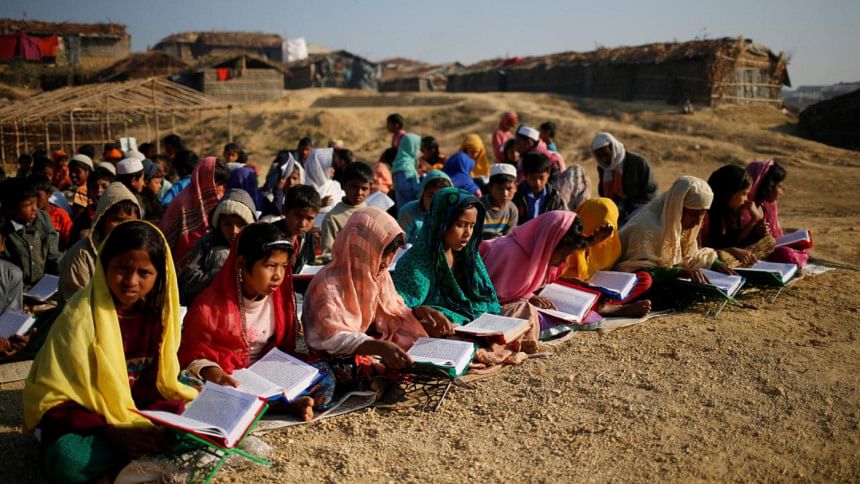A ‘lost generation’ of Rohingya will have nowhere to go

As the world observes the International Day of Education today, nearly five million children are growing up in Bangladesh without access to education. These include not just the 4.3 million Bangladeshi children who have not seen the inside of a classroom, but also the half a million Rohingya children who have been languishing in refugee camps in Cox's Bazar.
Whether we talk about the refugees returning to Myanmar when it is safe to do so, resettling in a third country, or another way to solve the crisis, without education, a generation of Rohingya children will lose the opportunity to claim their rights, improve their lives or contribute to the economy they live in. For the past two and a half years, their lives have been put on hold; their futures paralysed by a state of uncertainty.
Some of the Rohingya children, with whom I spoke, were on the verge of completing their schooling in a few months' time when they were forced to flee their homes by the actions of the Myanmar military, many of which amount to crimes against humanity. Since then, they have lost another two academic years. The longer they are forced to stay in the camps, the more distant becomes the prospect of them ever realising the opportunities every child deserves.
They are at risk of becoming a lost generation.
Children in the host community in Cox's Bazar face a similar, forbidding fate. According to a 2018 Rapid Education and Risk Analysis report by the USAID, Cox's Bazar has the lowest percentage of children of primary school age enrolling at first grade in the country at 71 percent, combined with the second highest drop-out rate at 31 percent.
The refugee influx in 2017 has adversely impacted the local economy further; with the cost of living increasing by five to seven times, skilled teachers have left schools and students have dropped out in Cox's Bazar for employment opportunities in the Rohingya camp, according to a USAID report. All of these have affected continuity of education for children in the host community.
The international community must continue to support Bangladesh and share responsibility of educating all children in Cox's Bazar—Rohingya refugees and the host community as well. Many countries including Canada and the United States are willing to support appropriate, accredited and quality education of children in the Rakhine state in Myanmar and Bangladesh.
However, what's more important for us to see is the consequence of a generation growing up without an education, a generation that will not be able to speak up for themselves, speak out against the violation of their rights, enjoy the benefits of an active and enlightened mind, or lift themselves out of their difficult situation.
The Convention on the Rights of the Child, a binding treaty which Bangladesh has ratified, makes clear that education can and should ensure the development of the child's personality, talents, and mental and physical abilities to their fullest potential whilst enhancing respect for human rights and preparing them for a responsible life in a free society. The alternative is to risk consigning many of them to a life of poverty and exploitation, including in some cases involvement in serious criminal activities such as drug smuggling, child trafficking or recruitment into violent armed groups.
Thousands of Rohingya children and youth are denied access to education in their villages and towns in Myanmar—where there are no schools and universities for them to attend—as well as in places they have sought refuge. This historic denial of access to education has ultimately pushed the entire Rohingya community behind over time.
We must ask ourselves if it is worth it to live in a world that lets this happen to a community. Perhaps an educated Rohingya can take care of his/her problems better than depending on international assistance that continues to shrink globally for refugees.
It is encouraging that the importance of appropriate, accredited and quality education for Rohingya children is acknowledged by some policymakers in Bangladesh. For a country that has prioritised progress on Sustainable Development Goals, achieving Goal 4 (Quality Education) should also be a target. But this needs to come into implementation at the soonest.
One Rohingya youth wrote in a recent opinion piece, "The international community can take action to help generations of Rohingya youth who have been targeted simply for pursuing an education."
We must also ask ourselves whether a country like Bangladesh, which is making strides in economic prosperity, can afford to see a generation stay behind. Instead, as we encourage rich nations to share responsibility for the crisis that has hit Bangladesh as a result of the refugee influx, the government of Bangladesh must use this moment to improve access to education for all children in Cox's Bazar.
Canada, for instance, has a USD 16 million project dedicated to "Health and Education in Cox's Bazar" which is in operation until July 2023 and a USD 5 million project dedicated to "Strengthening Quality Education for Children in Cox's Bazar, Bangladesh", which is operational until November 2021. Both the projects cover access to education of children in the host community and the Rohingya refugees. In September 2019, the United States announced more than USD 127 million in humanitarian assistance including access to education for Rohingya refugees in Bangladesh and Rohingya and members of other affected communities in Myanmar.
All of this support is very welcome but more needs to be done. This is reflected by the fact that the UN-managed Joint Response Plan will have a tentative appeal for about USD 877 million for 2020 to manage the needs of people affected by the refugee crisis.
An appropriate, accredited and quality education that protects the diversity of the social, cultural and linguistic identity of both the Rohingya and host community requires further discussion with respect to both logistics and resources. But this can only happen when the people and the government of Bangladesh acknowledge its importance in principle and show their support. One of the ways can be by signing this petition.
Saad Hammadi is Regional Campaigner for South Asia at Amnesty International. Available on Twitter: @saadhammadi

 For all latest news, follow The Daily Star's Google News channel.
For all latest news, follow The Daily Star's Google News channel. 



Comments